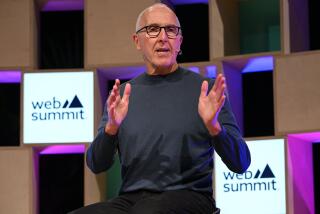Telecom tycoon has plans for wireless public safety start-up
- Share via
WASHINGTON — Morgan E. O’Brien is used to jolting the wireless industry. Now the Nextel co-founder is back in the start-up business and again aiming to shake up the airwaves.
In the 1980s and ‘90s, the former Federal Communications Commission staffer helped stitch together a nationwide network from mobile radio frequencies once used only by taxi drivers, truckers and pizza deliverymen. The result, Nextel Communications Inc., rose to challenge the major cellular companies, then merged with Sprint Corp. in 2005.
This time, the 62-year-old entrepreneur is pitching a controversial plan to transform public safety communications while also extending high-speed wireless Internet service to hard-to-reach rural areas.
His attempt to gain federal approval for his idea may be his biggest challenge yet. Supporters laud him as a visionary. Detractors brand him a profiteer.
But successful or not -- and the odds are against him -- O’Brien has renewed debate in Washington about the communications needs of public safety.
“He has always pushed the limit, thus far extremely successfully,” said Alan Tilles, a Maryland attorney who represents private radio operators and has dealt with O’Brien. “That takes a lot of nerve.”
So does his latest plan.
O’Brien wants Congress to turn over a large chunk of valuable public airwaves -- a multibillion-dollar swath of spectrum coveted by wireless phone companies -- to a nonprofit trust operated by public safety officials in partnership, he hopes, with his new McLean, Va.-based company, Cyren Call Communications Corp. Together, they would build a state-of-the-art, high-speed network covering more than 99% of the U.S. population.
The main purpose is improving the ability of law enforcement officers to talk with one another and to share maps, video and other digital data that are crucial at emergency scenes.
There’s a side benefit: extending commercial wireless service to isolated parts of the country that aren’t well covered by cable or digital subscriber line Internet connections. Supporters see that as the lure to get the private sector to build and operate the estimated $20-billion system, with the stipulation that customers would give local, state and federal authorities priority whenever they need it -- the way drivers must pull over when a fire truck wails behind them.
“We ask somebody to go into a burning building, and we know that the device they’re taking in there could be doing so many more things to make them safer, more effective,” O’Brien said.
He has lined up the support of many leading public safety organizations, seizing on their increasing frustration that more than five years after the Sept. 11 terrorist attacks many first responders still can’t talk with other public safety departments or share data over often outdated communications systems.
Steve Krull, president of the California Police Chiefs Assn., had given up hope of solving that problem.
“It’s one of those pipe dreams, and there’s no money to do it,” said Krull, police chief in Livermore, Calif. “This looks like an opportunity to not only build the infrastructure but run it.”
O’Brien also needs to sell the federal government on his proposal. He struck out with the FCC last year, so now he’s focusing on Congress. Sen. John McCain (R-Ariz.) is drafting legislation to create the proposed Public Safety Broadband Trust, and some rural lawmakers are intrigued.
Others say O’Brien’s plan is nothing more than a boondoggle.
“Public safety is just a fig leaf to profiteering,” said Michael Calabrese, director of the Wireless Future Program at the New America Foundation, a Washington think tank.
The wireless industry opposes the plan because it wants the spectrum for expanded coverage and services. High-tech companies also are opposed because they fear it will disrupt the 2009 conversion to digital TV.
The spectrum O’Brien has targeted includes some of the analog airwaves being given up by broadcasters, and it’s slated to be auctioned by the FCC no later than January 2008 to help fund part of the conversion.
O’Brien said the proposed public safety trust would pay $5 billion, raised by government-backed loans, for the spectrum needed for his plan, and the airwaves would remain in public hands. But the spectrum could fetch twice that amount at a competitive auction.
Some senators were critical of the plan when O’Brien pitched it at a hearing this month. And O’Brien is facing a daunting task -- persuading Congress to give him the spectrum before the FCC auctions it off.
O’Brien said he had been down this path before.
“If you know the story of Nextel ... it’s a story of overcoming ‘You can’t do that, that’s impossible,’ ” he said.
In the 1970s and ‘80s, mobile radio frequencies were a spectrum backwater used for short-distance dispatching. While working on private radio system issues during that time, first at the FCC and then as an attorney in private practice, O’Brien noticed that licenses for such frequencies could be bought for a fraction of the cost of cellular frequencies. Combining enough of those mobile radio bands and improving the technology would allow them to serve as a mobile phone network.
O’Brien’s idea eventually became Nextel, which teamed up with Motorola Inc. and cellular-phone pioneer Craig McCaw in the 1990s to compete with the existing cellular companies.
Many of Nextel’s frequencies are near the bands used by public safety radios. When interference problems developed around 2000, O’Brien took the lead at Nextel in trying to resolve them. He learned of the communications woes of first responders and gained their trust.
“He’s a multimillionaire. I’m sure he’d like to make some more money, but I don’t believe he’s motivated in this case by making money,” said Harlin R. McEwen, chairman of the communications and technology committee of the International Assn. of Chiefs of Police.
“I think he’s motivated because he really believes he can do something good for public safety,” McEwen said.
O’Brien does stand to make money under the plan if Cyren were chosen by public safety officials to manage the proposed broadband trust.
Opponents of the plan say that it would help line O’Brien’s pockets and that public safety doesn’t need any more spectrum. The government already has committed to doubling public safety’s current allotment after the digital TV conversion.
O’Brien’s plan calls for public safety to get even more spectrum -- half of what’s slated for auction.
Thomas J. Tauke, chief lobbyist for Verizon Communications Inc., said O’Brien was trying to use a federal subsidy to create a new wireless company. Verizon and other politically powerful wireless phone companies are fighting the plan.
But Tilles warned not to count out O’Brien.
“With Nextel, Morgan proved that he can be the guy who can push that rock up the mountain,” Tilles said. “Can he deliver again? It’s a huge rock.”







